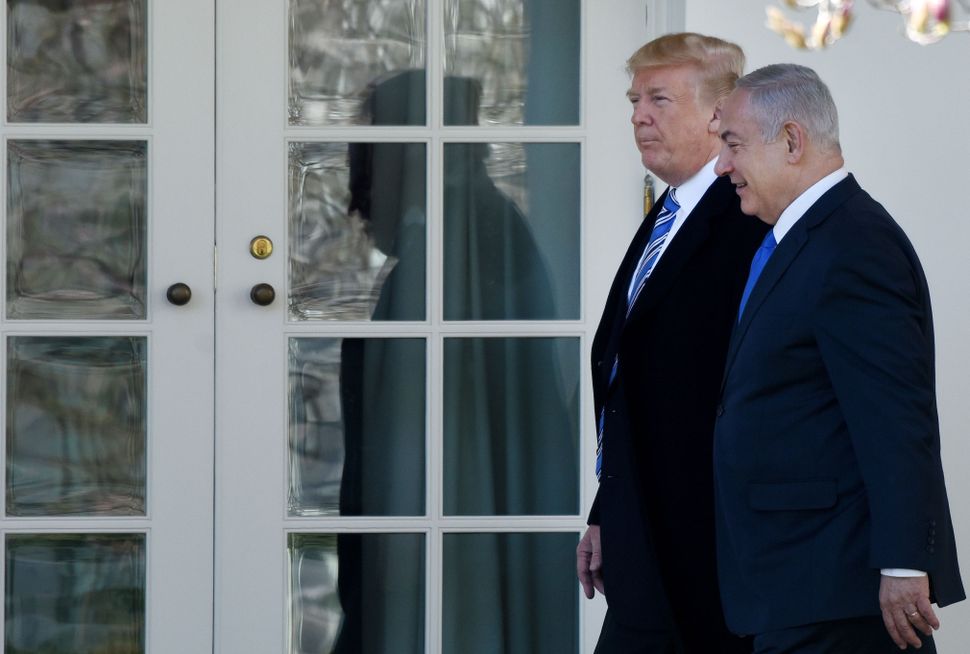Guess What? Israel Doesn’t Care What American Jews Think.

Image by Getty Images
This past week, the Trump administration inaugurated one of its signature foreign policy accomplishments: the official relocation of the American Embassy from Tel Aviv to Jerusalem. It was a striking moment, with the celebration coinciding with the killing of scores of protestors in Gaza. The embassy move and the withdrawal from the Iran Deal were both big wins for Benjamin Netanyahu, who vociferously opposed the Iran Deal in 2015 and has worked tirelessly to stymie Palestinian national aspirations. With these two measures, Trump has given new meaning to the idea that there’s no daylight between Israel and the U.S.
But far from delighting the American Jewish community, who overwhelmingly voted against Trump, it’s split public opinion. Some have urged that we show proper gratitude to Trump for fulfilling his campaign promises and fall in line with Israeli declarations regarding its security needs. Others have implored American Jews to be more vocal in pressuring or condemning Israel for excessive use of force against protesters, who have been predominantly if not exclusively non-violent.
But all this talk presumes that American Jews are central players in these dramas.
The truth is, we’re not.
For the Gaza protests, the withdrawal from the Iran Deal, and the moving of the embassy to Jerusalem have all exposed an uncomfortable truth that American Jews are just now beginning to wrestle with: Israel doesn’t care about us.
It doesn’t care what we think, it doesn’t care what we say, it doesn’t care about our politics, and it doesn’t even care about our security.
When comes to Israeli policy, or American decisions about Israeli policy, American Jews are simply irrelevant.
Over the past several years, the Israeli government has made a calculated decision that American Jews are disposable, and can be replaced by Evangelical Christians as their keystone international allies. The decision to allow Robert Jeffress and John Hagee to deliver the benedictions blessing the new embassy made abundantly clear who the Israeli government is interested in courting and who they consider dispensable. Jeffress has a history of bigoted comments against non-Christians and has suggested that all Jews are going to hell, and Hagee has probably done more than any other man to wrest control of pro-Israel discourse in America from away from Jews and into the hands of Evangelical Christians. Both clergymen represent much of what American Jews loathe about the religious right, but they’re equally representative of the Evangelical fervor Israel can freely enjoy.
The problem predates the Embassy ceremony, of course. The Netanyahu government has never much cared for American Jewish opinions on the Palestine question. Netanyahu’s policies have always stymied the establishment of a Palestinian state, even though defending the two-state solution is the demarcation of respectable American Jewish politics. He gleefully sought to embarrass the Obama administration at almost every turn, driving a wedge between the overwhelmingly-Democratic Jewish political community and the African-American community, even while three million American Jews voted for Obama.
And Netanyahu’s cozying up to the Trump administration even as they’ve stoked an unprecedented resurgence of antisemitic White nationalism has been so flamboyant as to almost constitute a taunt.
But it’s not just about questions of security. Israel has shown no interest in dislodging the Orthodox hammerlock on Israeli religious practice, despite the burdens it places on mostly non-Orthodox diaspora Jews. And the decision to renege on the egalitarian prayer agreement at the Western Wall, where we saw perhaps the single most concentrated explosion of American Jewish fury at Israeli government policy, made it abundantly clear that American Jews count for nothing in Israel’s political deliberations.
It’s gotten so bad that prominent American Jewish philanthropists are proposing opening up a new lobby in Israel to advocate for American Jewish interests—a sort of reverse-AIPAC.
Faced with this reality, Israelis are often dismissive. Why should they care what American Jews, those voices from the galut, think?
And in a sense, I understand them. We aren’t Israeli citizens. Politically, we can’t offer Israel anything they can’t get from other sources. And we’re prone to raising inconvenient questions about treatment of Palestinians, or making nettlesome demands for egalitarian prayer spaces, or disturbing carefully-laid coalition agreements by pushing for religious equality for non-Orthodox Jewish movements.
Evangelicals, of course, don’t do any of that. And so from the perspective of the Israeli government, Evangelicals are far more useful allies than Jews ever could be. Not only are there more of them, but they offer Israel unconditional support, whereas American Jews have an annoying tendency to want reciprocity.
So it’s not surprising that today the drivers of pro-Israel policy in the United States are almost exclusively Evangelical and right-wing Christian groups; while they purport to be allies of Jewish pro-Israel groups, these days they barely glance sideways if their Jewish “partners” express qualms about their agenda items.
And yet, the total abandonment of the Diaspora community feels new. For many years, Israel cared about the American Jewish community because Israel is the homeland of all the Jewish people, and there are reciprocal obligations that compel each side to care about and consider the other that transcend ruthless calculations of transient self-interest. Certainly, this is a theme Netanyahu has long appealed to in exhorting diaspora Jews to back him, and many American Jews have long gone to bat for Israel in public debates and international controversies, even when they’ve felt unease about the direction of Israeli governmental policy, precisely because they felt this sense of fraternal obligation.
But the difficult truth we’re now experiencing is that this sensibility is almost entirely asymmetrical.
We may care about Israel, but Israel doesn’t remotely care about us.
What does this mean? Well, for starters it suggests that if American Jews were more critical of Israeli policy, it probably wouldn’t change anything that Israel does, and if American Jews were more supportive of Israeli policy, it wouldn’t change anything either. The supposedly central role diaspora Jews play in American/Israeli relationships has dissolved into a mirage.
Whether you’re happy with the course of American/Israeli relations under Trump or infuriated by it, don’t look to American Jews for credit or blame. We’ve become irrelevant—almost complete non-factors.
But that pales in comparison to the challenge this poses to American Jewish self-identity. There has been years of work in the Jewish diaspora cultivating a sense of connectivity and shared destiny with Israel — and it worked! Seven-in-ten American Jews report an attachment to the state of Israel; it is a state whose security and future matters to us and whose life and well-being we’re invested in.
But what happens when we are forced to acknowledge that this relationship, so significant and meaningful to us, is utterly inconsequential to Israel?
This has been a difficult realization, and one I’ve come to with great resistance. But right now, I simply do not believe that the Israeli government cares about me or any other Jew in the diaspora as fellow Jews. They care to the extent we can deliver votes or provide aid or oppose BDS, but they can get those things from other people. They certainly don’t care enough to even slightly inconvenience themselves to take stands on issues we care about.
What we’re now seeing is an Israel that has decided it no longer needs American Jews and, more tellingly, concluded that, if it doesn’t need us, there’s no reason to care about us either.
David Schraub is a Lecturer at the University of California, Berkeley Law School and Senior Research Fellow at the California Constitution Center. He blogs regularly at The Debate Link and can be followed on Twitter @schraubd.
A message from our Publisher & CEO Rachel Fishman Feddersen

I hope you appreciated this article. Before you go, I’d like to ask you to please support the Forward’s award-winning, nonprofit journalism during this critical time.
We’ve set a goal to raise $260,000 by December 31. That’s an ambitious goal, but one that will give us the resources we need to invest in the high quality news, opinion, analysis and cultural coverage that isn’t available anywhere else.
If you feel inspired to make an impact, now is the time to give something back. Join us as a member at your most generous level.
— Rachel Fishman Feddersen, Publisher and CEO























